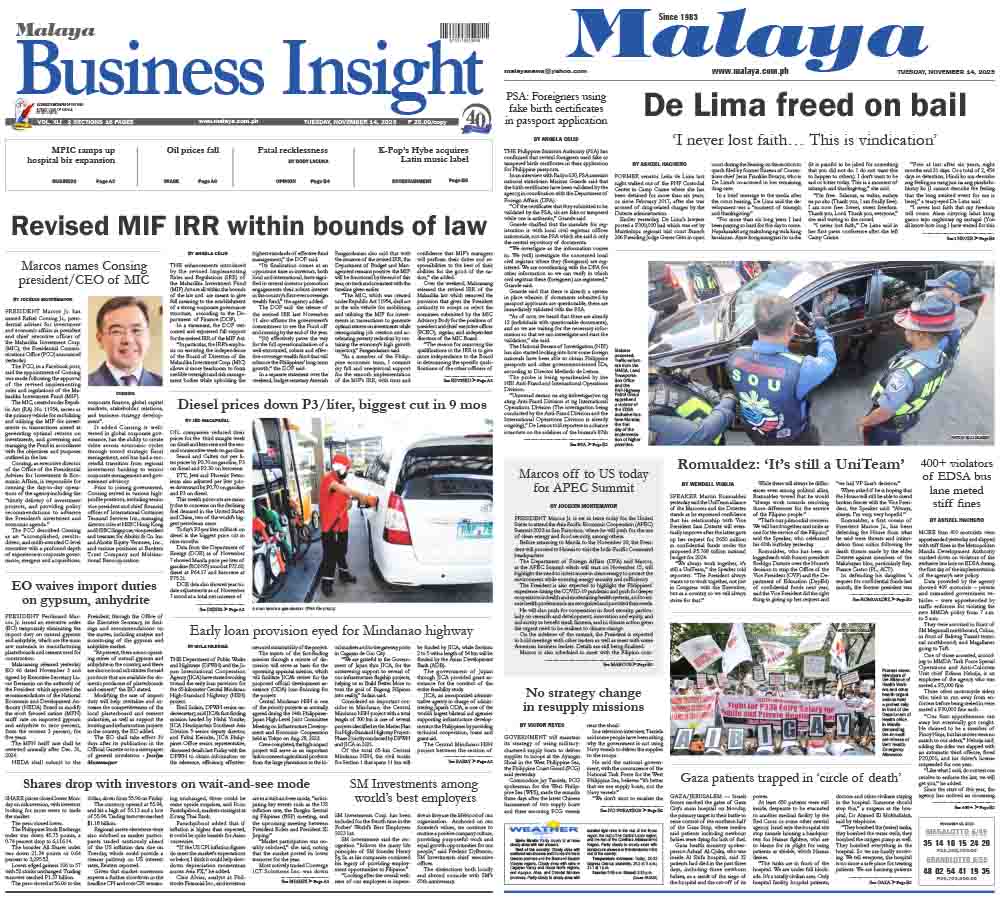Says it lacks safeguards to protect public funds
A MILITANT lawmaker yesterday called as “dangerous” the revised implementing rules and regulations (IRR) of the Maharlika Investment Fund (MIF) Act as she questioned the absence of crucial provisions to safeguard the independence and integrity of public funds.
Rep. France Castro (PL, ACT), a member of the militant Makabayan bloc, also said the new IRR raises doubts about “the potential for political interference” and lacks sufficient provisions on checks and balances.
She particularly questioned the President’s increased authority to select the Board of Directors which, she said, “further raises questions about the independence and integrity of the fund and poses a danger to people’s funds.”
“The justifications given for these changes, such as providing more independence to the Board, do not outweigh the importance of preserving significant safeguards and qualifications. The focus should be on ensuring accountability and safeguarding public funds, rather than granting unchecked power to a select few,” Castro said in a statement.
The revised IRR, Castro added, also raises alarm as it reduces the specific responsibilities of the audit and risk management committees and lowers the educational and professional experience requirements for top positions of the Maharlika Investment Corporation (MIC).
While the changes grant the Board of Directors greater power and independence, Castro said they also give rise to concerns regarding accountability and transparency.
The amended IRR, which is published on the website of the Official Gazette, showed changes to some of the sections under Rule VI, including Section 30 which now allows the President to either reject or accept recommendations made by the advisory body for nominees to fill the positions of president and chief executive officer (PCEO), regular, and independent directors of the MIC.
“In the interest and exigency of service, the Advisory Board shall submit to the Office of the President the list of nominees to vacant Regular and Independent Director, and the PCEO positions not later than thirty (30) days from such vacancy,” the provision read.
“Provided that the President may either accept or reject the recommendation of the Advisory Body: and, Provided, finally, that, the President may require the Advisory Body to submit additional names of nominees.”
The advisory body is made up of the secretaries of Budget and Management, the National Economic and Development Authority, and the National Treasurer.
Under the amended rules, the qualifications needed for regular and independent directors such as having a master’s degree in finance, economics, business administration or a related field, has also been deleted, along with the role of the corporate secretary, which was spelled out under Section 21 of the previous IRR.
The qualifications and functions of the MIC’s audit committee were also edited out, with the Board now allowed to determine the “qualifications, as well as the duties and responsibilities of the internal auditor.”
Castro called on the government to “provide clarity on how the revisions enhance the independence and accountability of the Maharlika fund.”
She also demanded an explanation on how these revisions impact the list of nominees already submitted to the Office of the President.
“The Filipino people deserve transparency, accountability, and the protection of their hard-earned funds. Our position stands that the Maharlika Investment Fund law should be junked but we will still vigilantly monitor the developments surrounding the Maharlika Fund and advocate for the best interests of the people,” Castro said.
POLITICAL INTERFERENCE
Speaker Martin Romualdez, the law’s principal author at the House of Representatives, defended the final IRR, saying it “will protect and guarantee the Fund from the dangers of political interference.”
“The autonomy of the MIC Board allows for more objective and effective decision-making, free from undue political influence. This is crucial in overseeing a fund of this magnitude, which is pivotal to our nation’s economic growth,” the Speaker said in a statement.
He said the new IRR clarifies the Board’s discretionary powers “while ensuring adherence to the law and alignment with the nation’s socioeconomic development program.”
Romualdez highlighted the specific instruction of the Chief Executive for the MIC Board to enjoy “independence,” which he said clearly demonstrates the President’s “strong commitment to good governance practices, which will foster investor confidence and attract more investment to our country.”
A co-author of the law (Republic Act No. 11954), Camarines Sur Rep. Luis Raymund Villafuerte, said the MIF would allow the President to “spend a lot more on infrastructure and his other priority programs without resorting to more borrowings that will bloat our public debt.”
INFO DRIVE
Villafuerte called on the Executive’s economic and communications teams to jointly mount a nationwide information, education and communication (IEC) campaign to inform the public that the new law would allow the government to spend much bigger on infrastructure and other priority programs via equity, rather than debt and financing – and so it can hit its goal of transforming the Philippines into an upper middle-income economy by 2025.
“The President’s economic team led should work in tandem with the Presidential Communications Office (PCO) and other traditional media and social media agencies of the government to bump up public awareness — and hopefully appreciation — of this new law,” he said.
Villafuerte said the people should be made to understand that tapping the MIF for additional foreign direct investment (FDI) inflows is a sure way to sustain the country’s post-pandemic economic rebound and create more jobs.
“As our economic managers go on an anticipated global road tour to pitch MIF to overseas investors, a nationwide IEC is in order so that an overwhelming majority of our people will not remain clueless that this wealth fund will allow President Marcos to fund more and bigger priority initiatives for the rest of his presidency — without unduly raising public debt — and keep on track his goal of transforming the Philippines into an upper middle income economy by 2025,” he said.





